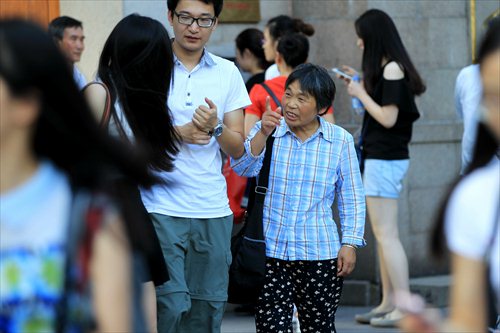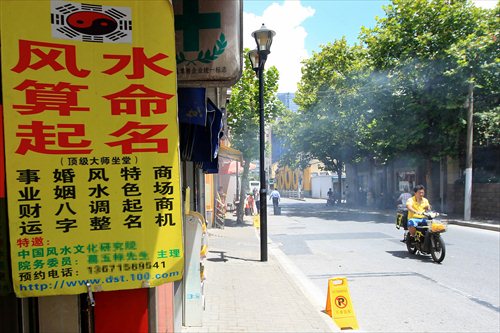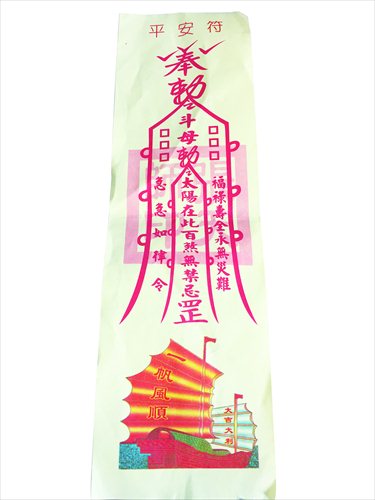A fortuneteller once sold me ...
Biting the bait to see what the soothsayers outside Buddhist temples actually do
Jing'an Temple, with its golden roof and red enclosures, attracts hundreds of tourists and Buddhists for sightseeing and worship every day. However, every time when I pass it, some middle-aged aunties chase me down, complimenting me and talking about personal prophecy.
These fortunetellers are a common scene around Shanghai's popular Buddhist temples.
They use temples as their guise, find vulnerable individuals who seek the help of Buddha, and con the fortune out of them. They love Jing'an Temple because of the large number of visitors and its location in the city center.

A woman chases down potential marks for fortunetelling.
Approach and buildup
When I passed by Jing'an Temple, a woman rushed up and asked: "Hello, beautiful! Do you want to know your fortune?"
I didn't answer and kept walking.
She followed and said: "It will only take a few minutes. You will encounter two joyous occasions this year. Your left eye says luck with men, and your right eye says wealth and power. Red lights shine between your eyebrows. You will have good encounters in August, September and October. And someone important will come to your assistance."
Me: "Do you tell this to everyone?"
"How could you say this? I practiced Buddhism at Jiuhua Mountain. I come here to find predestined friends. And you are a predestined friend," the fortuneteller said.
She kept talking, trying to persuade me to bite, which is the first step in the con. After some bargaining, I agreed to pay 50 yuan ($7.50) for palmistry and physiognomy analyses.
The woman took me to a place in front of the temple and sat me down.
Me: "Are you a Buddhist nun?"
"We believe in Buddhism, so we are believers," the fortuneteller said. No more mention of learning at Jiuhua Mountain.
Me: "Elder people might believe in it, but I don't."
Fortuneteller: "You'd better believe it. I do not usually read fortunes for young people, but you have red lights shining on your face, which others do not have."
She went on: "You are a girl, but you have the talents of a boy. You do not like bragging, and you have strong self-esteem. You look mild, but you would be a bit scary if you get angry."
After some more sweet-talking, the woman began to read my palm. This is when the real mumbo jumbo starts.
Reading my lifeline, she said I have a lot of talent but did not study hard when young. From the career line, she said I needed to grow steadily, step by step, instead of being anxious for success. From my love line, she warned me not to get married too early.
"Your fate says that you should get married late. If you get married too early, you will marry someone who is not meant to be, all right?"
The fortuneteller continued. Reading a line that is supposed to correspond to children, she said I will have two boys and two girls, boys first.

A signboard at a shop outside Jade Buddha Temple advertises fortunetelling services. Photos: Yang Hui/GT and Yang Lan/GT
The hurrah
After the professional palm reading, the clairvoyant began setting up the next step, the hurrah.
In a conventional and often more complex confidence scam, the hurrah is a moment of crisis when the victim must quickly decide whether to proceed.
Here the fortuneteller points out that the client will encounter disasters or bad luck in the near future, so he or she should pay her to mitigate the misfortune.
The fortuneteller said: "You have some bad qi (energy) between your eyebrows, despite the red lights. My advice is that you do not go to places where people have died, or walk alone at night, or go to hospitals."
"Bad qi? How did you see that?"
"My eyes have been consecrated!"
"Your yin is too strong and is oppressing your yang. This will affect your love relationships."
"I feel that I am good now."
"You are good now, but you have not achieved perfection yet. I told you that someone important might show up in August, and he is older than you. He might like you."
Then I told a lie to see her reaction: "But I am in a stable relationship."
Her prognosis changed fast.
"Oh I see - both you and your boyfriend are quite loyal to each other. You have a stable relationship."
In the end, the fortuneteller offered to help me turn around my bad luck for 99 yuan. She gave me a piece of yellow paper with some Chinese characters written on it that she called a charm and asked me for a strand of my hair.
"You need to wrap the hair in the charm, burn them together in the kitchen, put the ash in water and then use the water to water plants. After 49 days, you will feel it," she said.
For her work (and after my hard bargaining) the fortuneteller earned a total of 99 yuan. If she finds a loyal believer, the earnings could reach upward of 500 yuan.
At Longhua Temple, the situation is not much different. In my colleague's interaction with a male fortuneteller at the nearby metro station, the hustler initially asked for 200 yuan. His method was nearly identical to the Jing'an Temple fortuneteller's.
The opening statements were the same: "Hello beautiful - do you want to know your fortune?"
After a palm reading, the charlatan said that the reporter had a lot of things on her mind, might have changes coming at work, and did not have much wealth. "You will have two kids, one boy and one girl," the fortuneteller said.
For the hurrah, predicting ill fortune and offering help, the fortuneteller said my colleague might have a bad romantic relationship and be harassed by a man.
"You need to be cautious of thin men with small eyes and small noses. They can be villainous. But I can help you resolve the problem by burning a charm," the shifu (master) said.
Here, he put his own spin on the move.
"This charm is from Wutai Mountain."
The fortuneteller wanted to charge 200 yuan for burning a charm. After some harsh bargaining, he accepted to do it for 100 yuan.
Leading the reporter to a garden at a residential compound near the temple, the fortuneteller took out a piece of yellow paper, asked her not to read the content or stare at it, and burned it in front of her while saying unrecognizable prayers.
So now he's got his money, and he's delivered on his services. But with admirable business acumen, the fortuneteller sought to make my colleague a return customer.

"The talisman (pictured above) will keep you safe until the end of the year. You can come back to me after this. My dharma name is Huizhi," he said, giving her his phone number.
Speaking by phone, staff at Jade Buddha Temple denied that fortunetellers offered services outside the temple. However, women at a shop next door to the temple had beckoned my colleague to enter and tried to sell her charms to help remove bad luck.
The shop, called Jin Fo Ge, or the Golden Buddha Pavilion, was about 20 to 30 square meters, and the shelves inside stocked full of statues of Buddha, candles for worship and altars.
Five shop assistants sat at the door saying to passers-by: "Hi, the shifu has something to say to you!" or "your looks show that you will have great happiness!"
The shifu wore a monk's robe. After asking my colleague's age and job, he tried to tell her fortune, saying, "you would have a lot of happiness," "you will get married late" and "early relationships would have no good endings."
But the interaction ended when she refused to buy the yellow paper provided by the shop assistant.
After the experience with Jin Fo Ge, the Global Times phoned Jade Budhha Temple again. An operator who refused to give her name said that the temple has nothing to do with the shops outside.
"Activities like this are strictly banned inside the temple. And the shops outside are not related to the temple. Anyone could buy a monk's robe in China and wear it, and it does not mean that they are monks from our temple," she said.
When asked if the temple is aware of the activities by the shops outside, the operator did not answer.
Willing to pay
A law enforcement official told the Global Times that these fortunetellers have been seen in most Chinese tourism sites since the 1980s. Police have been working on stopping them since then.
But the fortunetelling hustle is different from the other cons, because if the clients believe in it, they will pay willingly and won't think that they're being scammed.
But, if the fortunetellers disturb order in public places, police could warn them or fine them 200 yuan.
If their behavior is severe, police could detain them for five to 10 days and fine them for 500 yuan.
Sheng Xiyu contributed to the story